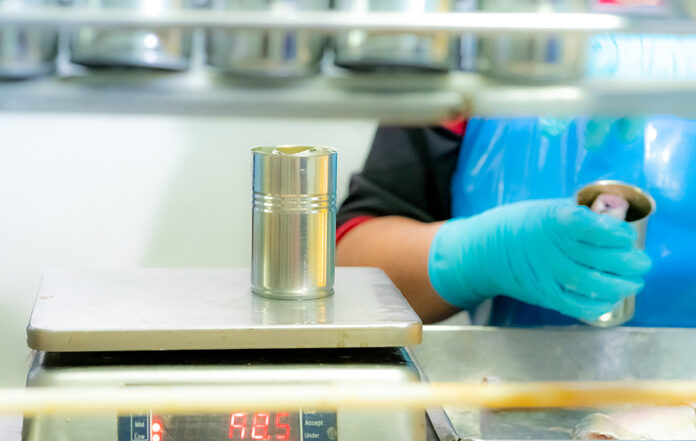
Article sponsored by ECI Software Solutions
By Kyle McTavish, Demand Generation Manager at ECI Software Solutions
In an ever-evolving food and beverage industry, precision is paramount. Consumer preferences, regulatory changes, and market demands steer the sector toward new horizons. Amid these transformations, the practice of catch weight, measuring and pricing products by weight, is gaining recognition as a linchpin of accuracy, transparency, and sustainability. This essential concept not only ensures that products are correctly measured but also aligns their weight with stringent labeling regulations.
Yet, the future of catch weight in the food and beverage industry is not merely a story of evolving practices; it’s a narrative enriched by the indispensable role of Enterprise Resource Planning (ERP) systems. ERP solutions are empowering manufacturers in this sector not only to adopt catch weight practices but to do so with efficiency, accuracy, and compliance.
Here, we delve into the prominent trends reshaping the food and beverage industry, exploring how ERP systems are instrumental in navigating the intricacies of catch weight management.
Demand for precision in weight measurements
In an era when consumers demand transparency and precision in product information, the food and beverage industry strives to meet these expectations. Catch weight practices ensure that products are accurately measured, and their weight aligns with labeling regulations. In the future, this demand for precision in weight measurements will only intensify.
How ERP helps:
To achieve precision in weight measurements, ERP systems provide real-time data and analytics, allowing businesses to ensure that products are correctly measured and labeled. By tracking weight variations and adjusting pricing accordingly, businesses can meet consumer expectations for accuracy.
Sustainability and ethical sourcing
Consumers are increasingly concerned about the environmental impact of their food choices. This shift towards sustainability has led to the rise of catch weight practices that support ethical sourcing and waste reduction. The industry is making strides in reducing food waste, and the future promises to bring even greater emphasis on sustainability.
How ERP helps:
ERP systems play a pivotal role in sustainability initiatives. These systems monitor resource use, optimize production processes, and provide traceability data. Businesses can track the environmental impact of their products, minimize waste, and promote ethical sourcing practices, aligning with the growing sustainability trend.
Market diversification and changing consumer preferences
The food and beverage industry is diversifying to meet the changing tastes and preferences of consumers. This includes adapting to dietary preferences, such as vegan or gluten-free, and offering an array of product variations. Catch weight practices are instrumental in managing this diversification, ensuring that products are correctly measured and priced to meet consumer demand.
How ERP helps:
ERP systems offer data analytics capabilities that provide insights into changing consumer preferences and market trends. With this information, businesses can adapt their production schedules and explore diversification opportunities. By tracking these trends, companies can respond quickly to changes in demand and adjust their production processes accordingly.
Regulatory compliance and labeling accuracy
Stringent regulations in the food and beverage industry make catch weight practices crucial. Regulators are emphasizing accurate labeling, ingredient lists, and nutritional information. Catch weight not only ensures compliance with these regulations but also provides detailed traceability data that is essential for audits.
How ERP helps:
Compliance with regulatory standards is a primary function of ERP systems. These systems offer real-time data and automated reporting, ensuring that products meet the required standards and can easily pass audits. By maintaining accurate records of catch weight data, businesses can navigate the complex landscape of regulatory compliance more efficiently.
Digital transformation and industry 4.0
The food and beverage industry is on the cusp of a digital transformation. Industry 4.0 technologies, like the Internet of Things (IoT) sensors and artificial intelligence, are entering production and packaging processes. Catch weight practices are becoming digitized, allowing for even greater precision and automation.
How ERP helps:
ERP systems are at the forefront of this digital transformation. They enable the integration of IoT sensors and automation systems, allowing for real-time data capture and updates. This digitization not only enhances catch weight practices but also boosts overall production efficiency, quality control, and transparency.
The future of catch weight in food and beverage
The future of catch weight in the food and beverage industry is promising and transformative. As consumers demand more transparency, regulators tighten compliance standards, and the industry embraces sustainability and digital transformation, catch weight practices are becoming increasingly vital.
Enterprise Resource Planning (ERP) systems are key enablers of these trends. They provide the data analytics, real-time visibility, and quality control capabilities necessary to ensure products are correctly measured and priced while supporting sustainability and compliance initiatives.
The food and beverage industry is poised for a catch weight revolution, where precision, transparency, and sustainability will be the cornerstones of success. Businesses that adapt to these catch weight trends and leverage ERP systems will not only meet the demands of today’s consumers but also shape the future of the industry.
Explore Deacom ERP
If you are in the market for a new manufacturing ERP solution or looking to replace one that’s not delivering the results you want, consider Deacom ERP, which was built for process manufacturing with many successful customers, specifically in the food and beverage industries. Deacom is an all-in-one software that does not have the complex maze of add-ons and integrations that many other manufacturing ERPs have. Utilize a solution that is truly tailored for your industry.






